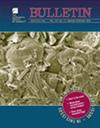格陵兰岛西部中部古元古代林克造山带构造
IF 3.9
1区 地球科学
Q1 GEOSCIENCES, MULTIDISCIPLINARY
引用次数: 0
摘要
提出了一种新的构造模式来解释格陵兰岛中西部古元古代Karrat群的构造地层演化和林克造山带的多期变形、岩浆作用和变质作用。卡拉特群的沉积开始于约2000 Ma以后的克拉通内裂谷盆地,其基底石英岩覆盖在Rae克拉通太古宙片麻岩之上。北部发育与裂谷有关的碱性火山岩和共裂谷硅屑沉积,南部发育蒸发-碳酸盐岩台地。1900 ~ 1850 Ma期间,裂谷盆地演化为弧后盆地,伴生亚碱性火山岩,并伴有Prøven火成岩杂岩的弧相关花岗岩类沿卡拉特群基底接触体侵入。卡拉特群和岩浆弧岩约在1830 ~ 1800 Ma的林克造山运动碰撞阶段发生变质作用。卡拉特群变质等级由南部的绿片岩相向北部的麻粒岩相递增,以杂岩化和s型浅花岗岩侵位为标志。在Prøven火成岩复杂岩浆弧以南的林克造山带上,广泛的东-东南逆冲侵位和褶皱辐合是林克变质作用后沿顶部- ese剪切带形成的弧-陆碰撞的特征。综上所述,卡拉特盆地发育于东倾俯冲之上的上板块,与林克造山带共同代表了弧陆碰撞的结果,弧陆碰撞形成了与俯冲体系相对立的弧后褶皱冲断体系。本文章由计算机程序翻译,如有差异,请以英文原文为准。
Tectonics of the Paleoproterozoic Rinkian orogen, central West Greenland
A new tectonic model is presented to explain the tectono-stratigraphic evolution of the Paleoproterozoic Karrat Group in central West Greenland and the polyphase deformation, magmatism, and metamorphism of the Rinkian orogen. Sedimentation of the Karrat Group initiated after ca. 2000 Ma in an intracratonic rift basin with basal quartzites overlying Archean gneisses of the Rae craton. Rift-related alkaline volcanic rocks and synrift siliciclastic sediments were deposited in the north while an evaporite-carbonate platform developed in the south. The rift basin evolved to a back-arc basin, with associated subalkaline volcanic rocks, concomitant with the intrusion of arc-related granitoids of the Prøven igneous complex along the basal contact of the Karrat Group between 1900 Ma and 1850 Ma. The Karrat Group and magmatic arc rocks underwent metamorphism ca. 1830−1800 Ma during the collisional phase of the Rinkian orogeny. The metamorphic grade of the Karrat Group increases from greenschist facies in the south to granulite facies in the north, where it is marked by migmatization and emplacement of S-type leucogranites. Extensive east-southeastward thrust emplacement and fold vergence characterize the Rinkian orogen south of the Prøven igneous complex magmatic arc, where the arc-continent collision is established along a top-to-the-ESE shear zone postdating the Rinkian metamorphism. In summary, the Karrat Basin developed on the upper plate above eastward-dipping subduction and, together with the Rinkian orogen, represents the result of arc-continent collision that initiated the structuring of a back-arc fold-and-thrust system antithetic to the subduction system.
求助全文
通过发布文献求助,成功后即可免费获取论文全文。
去求助
来源期刊

Geological Society of America Bulletin
地学-地球科学综合
CiteScore
9.30
自引率
8.20%
发文量
159
审稿时长
4-8 weeks
期刊介绍:
The GSA Bulletin is the Society''s premier scholarly journal, published continuously since 1890. Its first editor was William John (WJ) McGee, who was responsible for establishing much of its original style and format. Fully refereed, each bimonthly issue includes 16-20 papers focusing on the most definitive, timely, and classic-style research in all earth-science disciplines. The Bulletin welcomes most contributions that are data-rich, mature studies of broad interest (i.e., of interest to more than one sub-discipline of earth science) and of lasting, archival quality. These include (but are not limited to) studies related to tectonics, structural geology, geochemistry, geophysics, hydrogeology, marine geology, paleoclimatology, planetary geology, quaternary geology/geomorphology, sedimentary geology, stratigraphy, and volcanology. The journal is committed to further developing both the scope of its content and its international profile so that it publishes the most current earth science research that will be of wide interest to geoscientists.
 求助内容:
求助内容: 应助结果提醒方式:
应助结果提醒方式:


